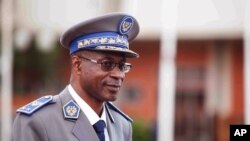A military tribunal in Burkina Faso on Tuesday handed down a sentence of 30 years to the wife of a general convicted of leading a deadly coup bid four years ago.
The prison term imposed on Fatoumata Diendere exceeds the 20-year sentence given to her husband Gilbert Diendere on Monday for masterminding the 2015 plot against the west African country's transitional government.
Instigated by soldiers from an elite army unit loyal to ousted president Blaise Compaore, the putsch failed after army-backed protesters stormed the rebels' barracks.
Dozens of defendants, including top generals and politicians, were put on trial over the coup, which killed 14 people and wounded 270.
Gilberte Diendere, who had been Compaore's right-hand man and a former head of the elite unit, the Presidential Security Regiment (RSP), was convicted on Monday on charges of murder and harming state security.
His wife was found guilty in absentia on Tuesday of similar charges, as well as assault and battery.
According to the military prosecutor, she had "suggested in a phone call to her husband that he start a rebellion from the Po region (in Burkina Faso's south) when she knew that the coup would fail, and that he would incur the maximum penalty".
She also gave 10 million CFA francs (15,000 euros) to two of the putschists, Colonel Mamadou Bamba and Traore Abdoul Karim Andre, the prosecution said.
Traore was the mastermind behind the rebels' governing body, the so-called National Council for Democracy, according the prosecution, which said he wrote the coup leaders' statements read out on television by Bamba.
Traore, who has been on the run since 2015, was given a 30-year sentence, while Bamba was sentenced to 10 years, five of them suspended.
Diendere's main co-plotter General Djibrill Bassole — one of the Compaore regime's most visible figures — was sentenced to 10 years when the first verdicts against 84 defendants were issued on Monday.
Another eight people were convicted on Tuesday and sentenced to between 10 and 30 years in prison.
Compaore had fled to Ivory Coast in October 2014 after 27 years in office marked by assassinations and mounting public unrest in the deeply poor and unstable Sahel state.
He was forced out by a revolt sparked by his attempts to extend his grip on power, and a transitional government took the helm.
The subsequent coup caused deep ructions in the armed forces, weakening their ability to cope with mounting jihadist attacks that have now claimed more than 500 lives, analysts say.
Many in Burkina hope that the trial will usher in a period of reconciliation, with lawyers representing civilian plaintiffs describing the verdicts as a victory for the state of law in the country.




